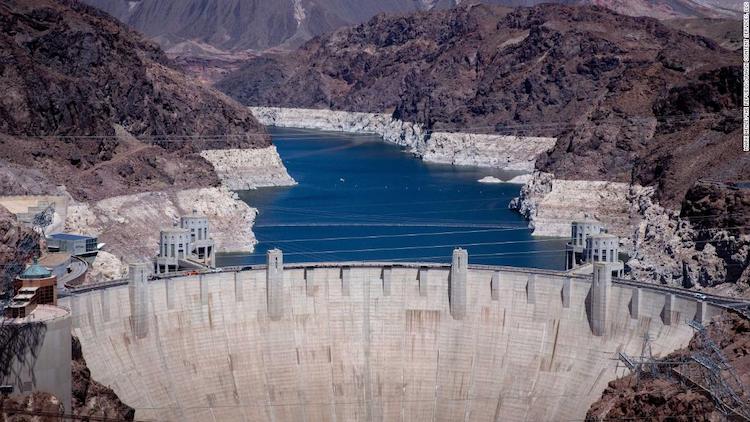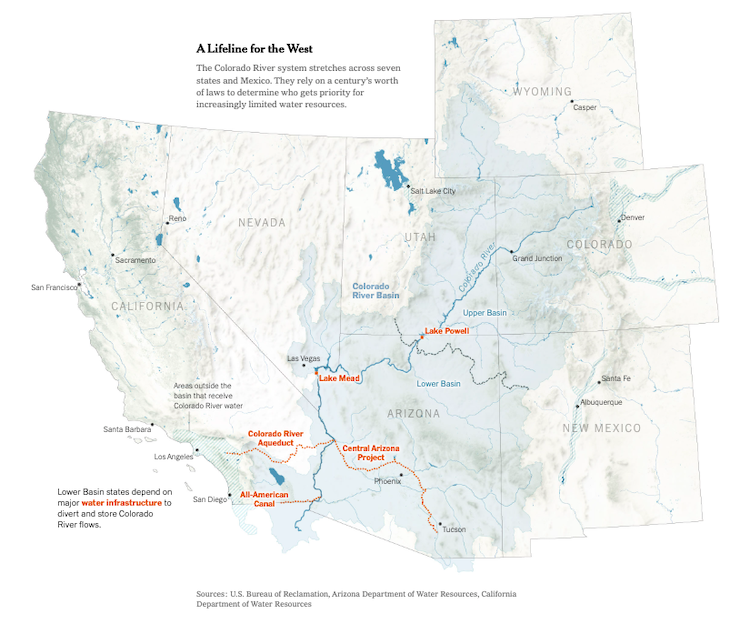
I’ve always loved the American West. I’ve loved its beauty and I’ve loved its history. I know there’s a draw for a lot of us to think this way. It’s still such a wild land in some (ever-dwindling) places.
So articles like the one presented by the NY Times Daily podcast – “7 States, 1 River and an Agonizing Choice” — catch my eye. Years of drought in the West, as well as mismanagement and incredible population growth, have nearly decimated the Colorado River system. So now it’s time to come up with a solution…before it’s too late, and a condition called “Deadpool” – that is, water levels so low that water can no longer pass over the dams at Powell and Mead – kills the river.
Still, I want to be thoughtful in my approach here. I can sit back and condemn the people who have moved to the area and placed such a strain on the system – I mean, it’s pretty clear that these places weren’t really meant to be inhabited…until we could get water to them – but aren’t I part of the problem too? I, myself, would be more than happy to move into the area. It’s not much different than getting upset at the crowds at a national park…when you yourself are part of that crowd.
The sad thing, though, is that money drives it all. More people mean more taxpayers. More taxpayers mean more power. And if you can build a few good golf courses, we’re talking rich people — the best kind, if you’re a politician. Think about it: what do you think the chances are that Palm Springs is going to take a hit commensurate with the people of Compton or East LA? If only we could make a system where the vote of the poor is worth more than the rich (sadly, it wouldn’t take much more than a few bucks to corrupt that system too).
The answer should be obvious though, and I’m sure some of this is in place already. No more lawns. No more golf courses. No more car washes. Prioritize based on common societal benefit. Do we need the Imperial Valley and its food supply. Yes. Do people who live in the desert need to drink water and (occasionally) bathe? Wash their clothes? Sure, although they should realize that even bathing and washing clothes might end up being a luxury. That’s the problem – we’ve made water far too plentiful in places where it doesn’t naturally occur.
Maybe people will have to move. Some will certainly lose their homes. And this is unfortunate, because they probably weren’t clued into the dangers of building and buying homes in the desert. Fifty years ago for sure you had few people thinking that if it didn’t snow way up there in Colorado or Wyoming, they wouldn’t get enough water down there in Phoenix.

Here’s where they’ve been sold a bill of goods, because the governments of every one of the seven states served by the Colorado River had to know that the river hasn’t pumped out 17- or 18-million acre-feet in decades, if at all. They’ve known for years that water levels have been dropping dramatically. And yet they hung their hats on the optimistic thought that there’d be a recovery. That it would only take one or two good years to get back on track. In the meantime, build, build, build.
But it’s one of the bugs of our system. We know that there are few politicians around who are willing to bite the bullet and tell the truth. Because their constituents are more than happy to vote them out if they don’t say and do what they want said and done. It reminds me all over again of Michael Jackson and Elvis – if this doctor won’t give you the drugs, you’ll fire them until you find one who will. And we know how that ended.
This isn’t my ball to play with though. I’m sure food prices will go up dramatically, but I’m not the one who will have to leave the home I thought would be my last one. I’m not going to have to tighten my habits and bathe once or twice a week. Or put up with brackish and nasty-tasting drinking water because I can’t afford to live somewhere where water is fresh and clean. Right now for me, it qualifies as a terrible shame. A lot of people are going to lose. Some, much more than others. Some who can’t afford it.
And the American West is losing too. I don’t want to say, “good!” just because it’ll keep out the riffraff. But I’m always a little leery of we humans trying to tame some aspect of creation. As dry (or wet) any particular part of nature was two-hundred years ago, it was natural. Plants grew in places they were meant to grow. I’m fascinated talking to my son, who’s done a lot of research on native species to plant around his home in Texas. I know a lot of people have done that wherever they live, and I applaud that. But sometimes, creation comes back to bite us. In the case of the Colorado River, I hope we can come up with a solution where it doesn’t hurt too much.
Here is a print article by the same author as quoted in the Daily podcast. May require a subscription.
